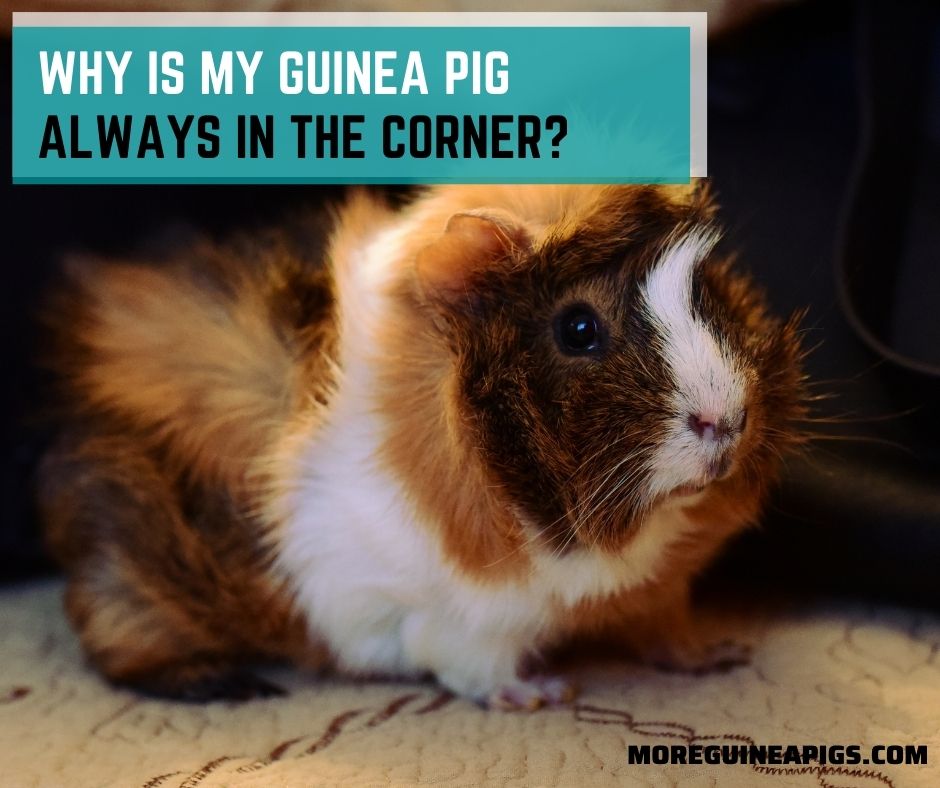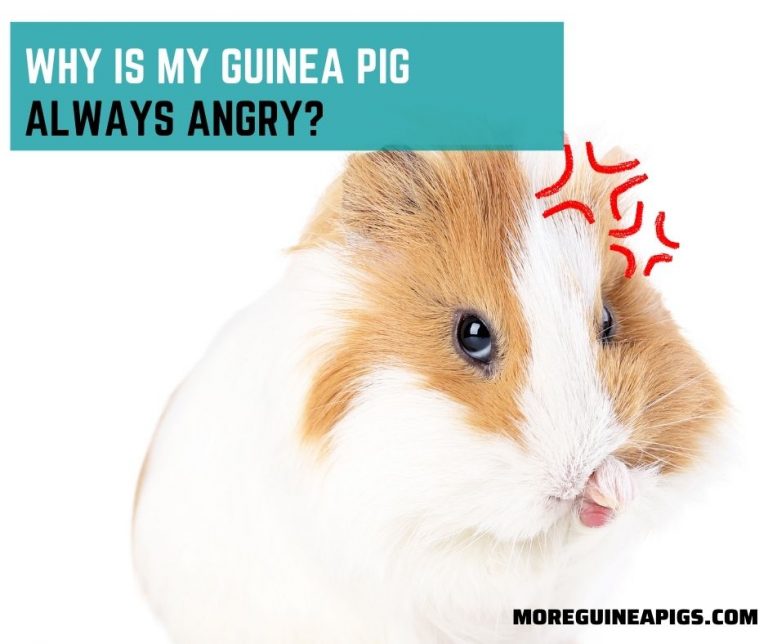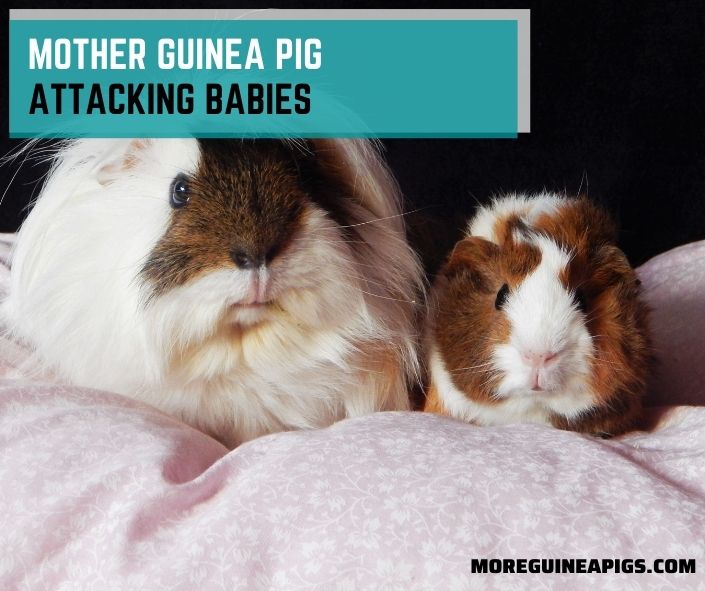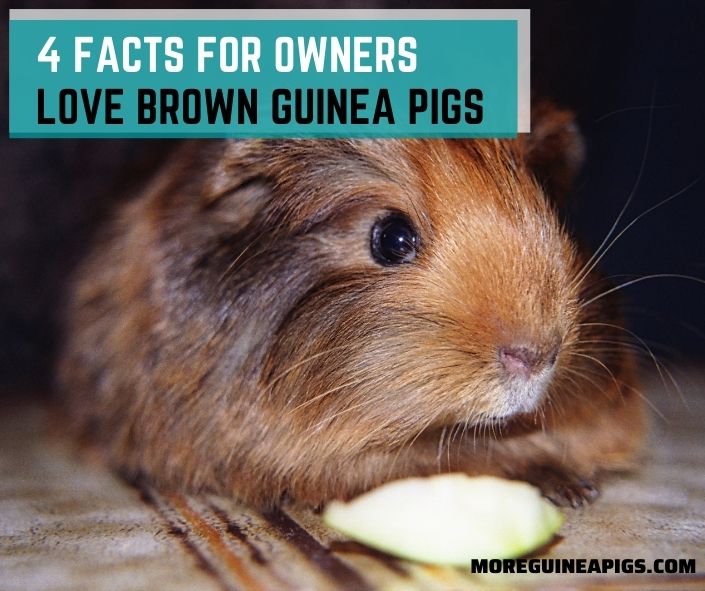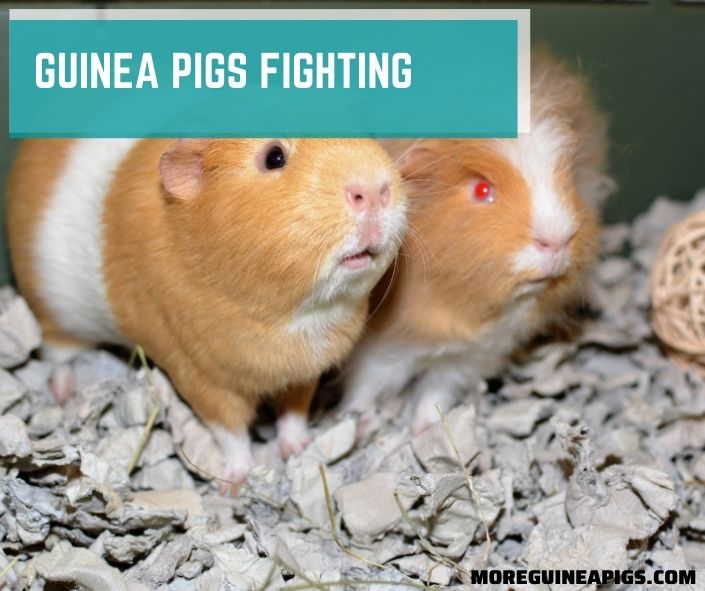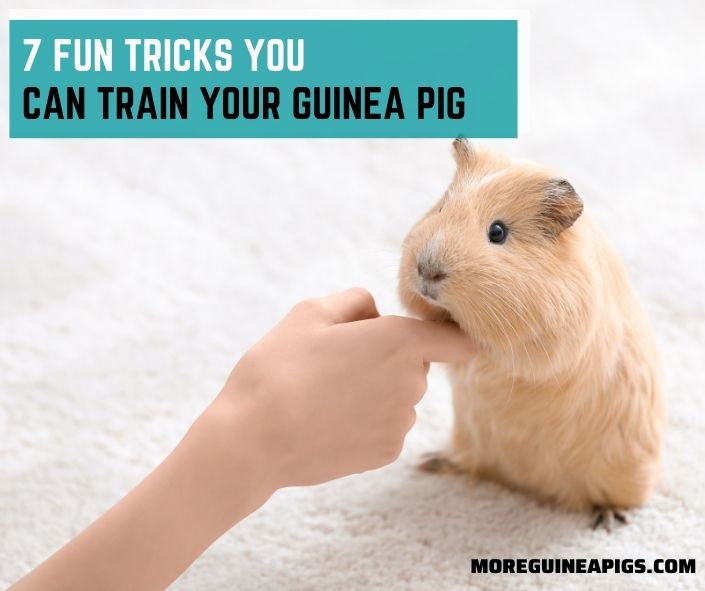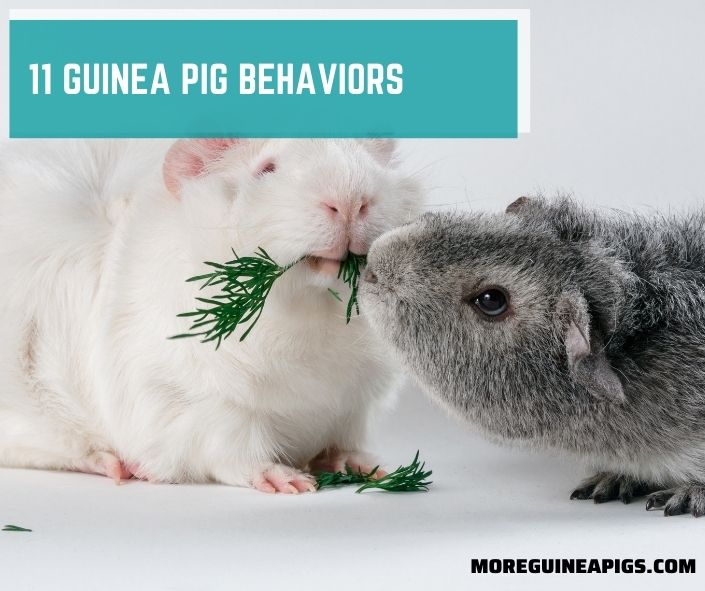Why is My Guinea Pig Always in The Corner?
Is your guinea pig huddled in the corner? Are you wondering: ‘why is my guinea pig always in the corner?’ It is natural to worry that something may be wrong with your little furry friend.
After all; sudden changes in behavior almost always point to an underlying cause when it comes to decoding guinea pig behavior.
If you want to get to the bottom of ‘why is my guinea pig hiding in the corner’, read on, we have important information for you.
Is It Normal For Guinea Pig to Stay in Once Spot?
It is usually not normal for a guinea pig to stay huddled in one spot. Healthy guinea pigs are quite active and if your pet isn’t moving much then there is a chance that it may be ill, afraid, or stressed.
Sometimes though, your guinea pig may simply be tired and may be resting when it remains huddled in one spot.
Typically, this is normal behavior, if your pet seems healthy otherwise and is eating well and not showing any signs of stress or illness.
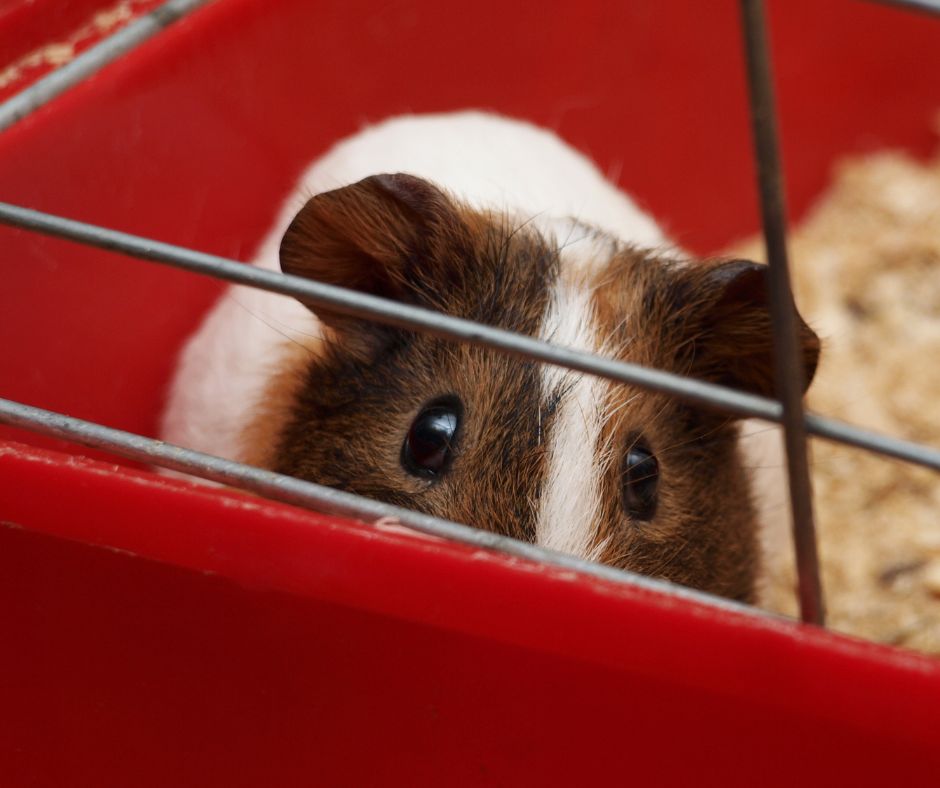
The behavior of guinea pigs staying rooted in one spot mainly depends on the spot/location in question. For example,
- If your pet is staying near the water dish or bottle – it may be dehydrated. Check out our guide on guinea pig drinking a lot of water
- Your new guinea pig is huddled in the corner – this is normal. The new cavy might be shy (as they usually are). It needs time to explore and get comfortable in its new surroundings. Be patient. Provide plenty of hiding places (boxes, tubes, decorations, etc.) in the cage.
- Your pet is staying by the feeding area – This is also normal behavior. Most healthy guinea pigs love to eat constantly and also need to chew all the time to keep their sharp teeth toned down.
- In case of multi-pig enclosures– Guinea pigs follow a social hierarchy and might divide the territory where one pig stays in one corner while the other remains by the bed or near the sleeping area. As long as both pigs are eating well, not fighting/bullying, or showing any health issues, this is not a cause for concern.
As can be seen staying in the corner is not always a cause for concern as long as your pet is thriving otherwise.
However if your otherwise active guinea pig suddenly becomes withdrawn, stops eating, and becomes lethargic, then a trip to the vet may be necessary.
BWOGUE Large Grass House for Guinea Pigs
Why Is My Guinea Pig Always in The Corner?
When your guinea pig shows a change in behavior, then asking the reason why is the best thing to do.
Being tiny creatures, even small changes in regular habits can indicate big issues. Early detection can help you take corrective action and prevent problems from escalating.
Let us take a closer look at the reasons why your guinea pig may be huddling in the corner.
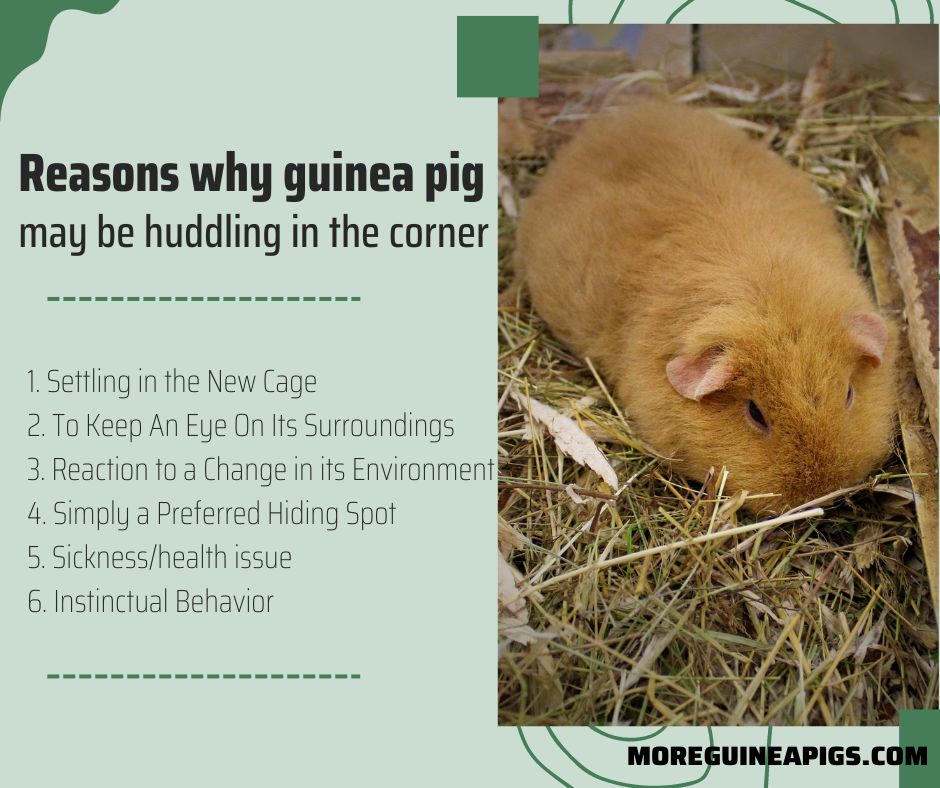
1. Settling in the New Cage
A new cavy will take some time to become more confident and meet people. It may take time to get used to the new sights, smells, and sounds.
Observe your pig and ensure that it comes out to eat and does not keep hiding for several days. Make sure it is not losing weight.
2. To Keep An Eye On Its Surroundings
Sometimes, cavies like to stick around in one corner of the cage as it gives them a vantage point to see what is going on around them. Some piggies stick to the corner as it is better to keep an eye on outside of the cage as well as the water dish, the feeder, and the other cavies.
3. Reaction to a Change in its Environment
Have you introduced a new toy or object in the cage? Perhaps your cavy is afraid or stressed due to that.
A dirty or cluttered cage or a new noisy toy that your pet does not like could also cause it to huddle or stick around in the corner.
4. Simply a Preferred Hiding Spot
If there is no change in your buddy’s environment and it is eating and drinking normally, there could be nothing to worry about. The corner simply is your pet’s preferred hiding spot that makes your cavy feel safe and comfortable.
5. Sickness/health issue
Rarely, if a guinea pig is always in the corner, it could be due to an underlying health issue. If your pet is facing the corner and not the center of the cage, it could be in pain.
If your buddy is hunched over and not moving at all while facing the other way and not towards its cagemates or cage objects, then it might be sick or injured.
Please check out our guide on Disorders and Diseases of Guinea Pigs where we discuss common health issues in guinea pigs and ways to treat them.
6. Instinctual Behavior
Every animal is gifted with an instinctual fight-or-flight response which helps all species survive.Sometimes, huddling in the corner may be an instinctual response in your guinea pig.
Your pet is simply doing what it is ‘hardwired’ to thanks to the information in its DNA. Again, such behavior usually stems from fear or stress.
What Should I Do If My Guinea Pig is Always In The Corner?
Determining the root cause of a peculiar uncommon behavior is the best way to take corrective action for your guinea pig. There are several things you can do in this case:
1. Observe your pig
Not all behaviors are abnormal. Sometimes, it may be your guinea pig’s instinct to stay inactive for brief periods.
If your little guy or girl is eating normally and seems healthy otherwise, you simply need to accept it as a part of their natural behavior.
2. Make changes
If your pig stays in the corner for long periods of time, consider its environment. Have you made any changes? Is there a new toy or object that may be stressing or scaring it? Is the cage cluttered or dirty? If so, clean it up, remove the offending object and check if the behavior reduces.
3. Give your new cavy time to adjust
Allow your new cavy time to adjust to its new environment. Make sure its other cagemates are not bullying it. If yes, separate them temporarily.
4. Know when to see the vet
If a normally active and outgoing cavy suddenly becomes withdrawn and seems hunched over or huddled over in the corner, then have it checked by the vet.
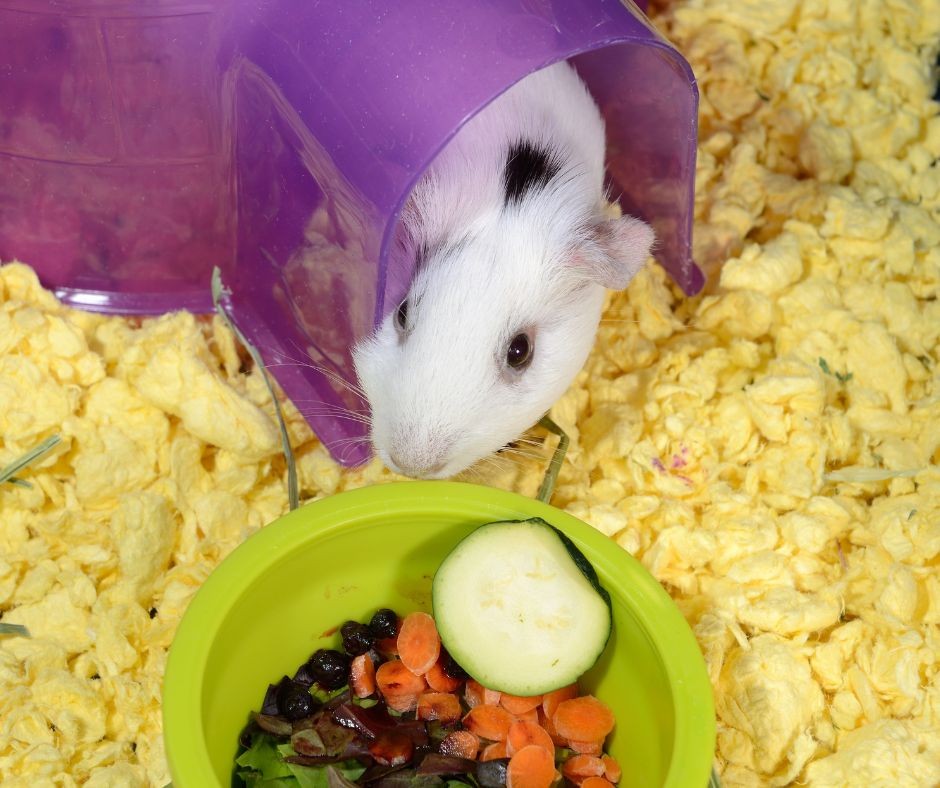
Key Takeaways – Why Is My Guinea Pig Always In The Corner?
If you’re wondering ‘why is my guinea pig always in the corner’, chances are that is may be afraid, stressed, or sick. Sometimes though, it is just a part of their natural behavior.
Observe your pet for several days. If it eats and drinks normally, then there may not be any cause for concern. Otherwise, a trip to the vet is warranted.
We hope this guide helps you decipher the exact reason and take corrective steps.
